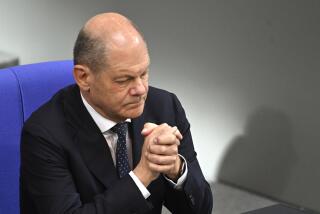Schroeder Stepping Up Tax Cut to Spark Growth
Pinning his hopes on consumers to revive Europe’s largest economy, Chancellor Gerhard Schroeder announced plans Sunday to accelerate a tax cut to send a “signal of revival” to citizens unsettled by reductions in Germany’s generous welfare state.
Schroeder, whose Cabinet approved the tax proposal during a three-day retreat to discuss the weak economy, said the program would spur growth by returning $28.5 billion a year to taxpayers.
“Reforms sometimes hurt, but they also pay off,” the chancellor said after the meeting outside Berlin.
Schroeder hopes to bolster an economy that has suffered weak growth for three years, raising unemployment above 10%.
The chancellor’s proposal would advance by a year $20.5 billion of a previously approved tax reduction for 2001-2005. An additional $8 billion has been approved for Jan. 1.
“This government is improving the framework for more growth in Germany,” he said. “I think and I hope that this weekend sends a signal of revival to the people of this country.”
Selling state assets and reducing subsidies would offset some of the shortfall in revenue, Schroeder said. But he gave few details and left open how much new debt his center-left government would assume.
That prompted renewed threats from opposition leaders to block the new measure in the upper house of Parliament, where Schroeder lacks a majority.
“Of course we want tax relief, but not on credit and not with new tax hikes,” said Edmund Stoiber, the conservative governor of Bavaria who was edged out in national elections in September. “I’m astonished the government has presented such a vague formula.”
Schroeder has announced cuts in jobless benefits and health-care programs jointly financed by firms and workers, a move that was supposed to leave companies with more funds for investment.
The government is also cutting the red-tape that makes it hard for firms to fire employees. Industrialists say the restrictions make them reluctant to hire new workers.
To shore up its finances, Schroeder said the government wanted to cut subsidies and tax breaks worth $51.4 billion by 2010. He invited Germany’s 16 states to discuss how that figure can be increased to offset the tax cuts.
Finance Minister Hans Eichel said sales of government assets, such as shares in former state monopolies Deutsche Telekom and Deutsche Post, would take place “to the degree that it can be accommodated on the market.”
Eichel said the government is still planning to bring the budget deficit down next year to 3% of gross domestic product -- the limit set by the European Union to guard against inflation and protect the value of the euro.
“Germany and Europe are depending on us to return to growth,” Eichel said. “If the biggest economy limps on, that’s a difficult situation for everyone.”
The tax cuts, which also benefit small businesses, would reduce the top rate of income tax from 48.5% to 42% and the bottom rate from 19.9% to 15%.
Countering criticism from within his Social Democratic Party that his economic reforms are too hard on poorer Germans, Schroeder said that a married worker earning $34,000 would pay 27% less tax under the new plan. Someone earning $170,000 would pay 11% less, the chancellor said.
More to Read
Sign up for Essential California
The most important California stories and recommendations in your inbox every morning.
You may occasionally receive promotional content from the Los Angeles Times.










